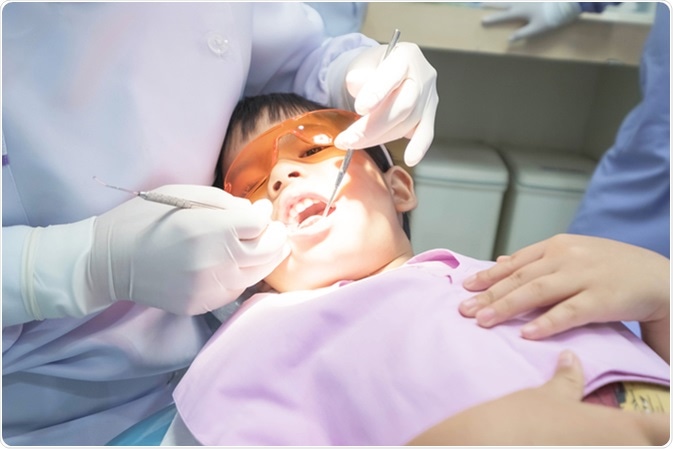Dental problems cause many children to experience dental caries and their complications, both in childhood and in later life. It is estimated that about 42% of children aged 2 to 11 years develop dental caries, and that an equal percentage of 6 to 19-year-olds develop caries in their permanent teeth.
But why is it important to teach and achieve good oral hygiene in children? This article describes some reasons.

Image Credit: WIN12_ET / Shutterstock
Overall Health
First, dental health affects the child’s overall health. Bad dental health may impact the development and growth of the child in several ways. With respect to physical health, dental condition affects feeding, proper breathing, speaking, smiling, and adapting to social situations. Poor dental health may cause pain and discomfort, embarrassment, lower self-esteem, and inability to perform activities of daily life. Children with bad teeth may not grow properly, be underweight, show irritability, be more prone to illness, have higher rates of hospital admission, and complain of sleep disruption.
Cognitive Development
Poor dental hygiene has also been associated with lower intellectual performance, as demonstrated by lower cognitive scores and relative impairment of learning ability. Low grades are more common, as are school absences due to toothache or infection. Whereas routine dental checkups and procedures do not typically interfere with school attendance, dental emergencies resulting from poor oral health do affect school attendance. Children with poor dental health have poorer school performance globally. In one study, these children had a 52% higher risk of having problems at school, a 42% higher risk of missing school, and were 24% less likely to complete all homework.
Dental Health Check for Kids
Chronic Medical Conditions
It is well-established that dental infection leads to later chronic medical conditions, with cardiovascular disease and gum disease being highly correlated. Other conditions linked to poor oral health include diabetes and stroke. Since the foundations of good oral health are laid early in life, it is essential to teach children how to take care of their teeth and gums.
Other Preventable Conditions
Regular assessment of the teeth and gums in children also helps detect many other general health conditions such as vitamin deficiencies, bruxism (tooth grinding), and acid reflux. These early findings allow for the prevention and correction of tooth decay. Moreover, tumors of the mouth are also caught early by preventive dental checkups.
Psychosocial Consequences
Very poor dental health also causes a number of psychosocial consequences in childhood and adolescence. For instance, repeated toothache can make children more bad-tempered and unable to develop emotional equilibrium, as well as decrease their involvement with peers and community members in play and other group activities. Dental malocclusion may result in fear of real or perceived rejection by others. When the front teeth are injured or unhealthy, children fear that they are unattractive. This feeling leads to social withdrawal, avoidance of smiling, shyness in the company of others, and preoccupation with what others think about them. These children have a 30% to 40% higher risk of developing feelings of being worthless, unhappiness or depression, fear of being friendly, and increased tendency to feel and act shy. These findings are most pronounced in adolescents with bad oral health.
Conclusion
Training children and motivating parents and caregivers to look after the oral health of children yields rich dividends in the form of reduced dental pain, better dental health, proper dental function, and less dental expense. Additionally, good oral health in children also boosts academic and social development. These benefits underlie the need to present and make use of dental preventive services in early childhood. While most children do begin to take better care of their teeth by the time their permanent teeth come in, this may not occur in all cases. Thus early interventions may have a continuing and increasing effect on the child’s overall health in many ways.
Further Reading
Last Updated: Nov 20, 2018